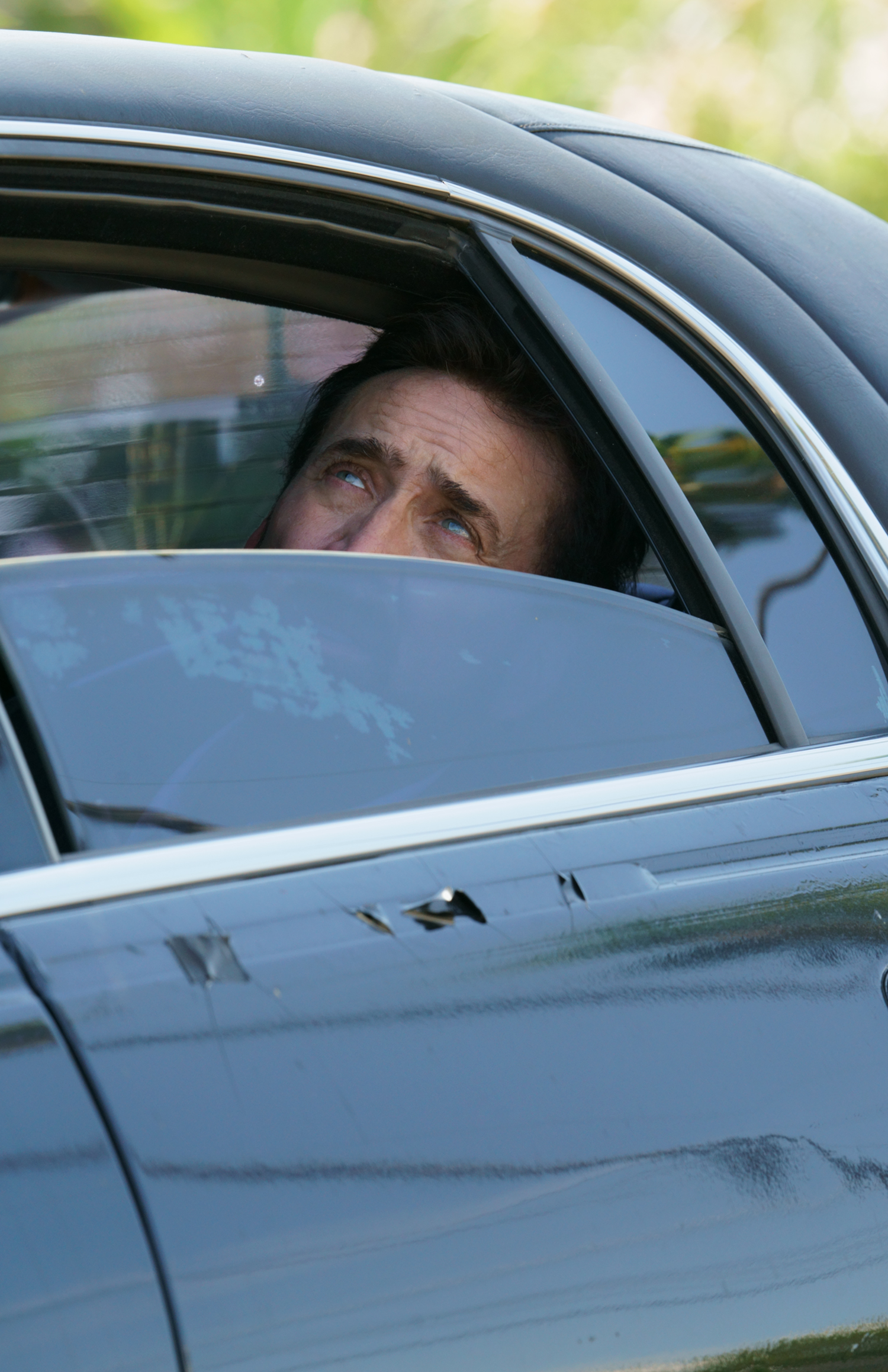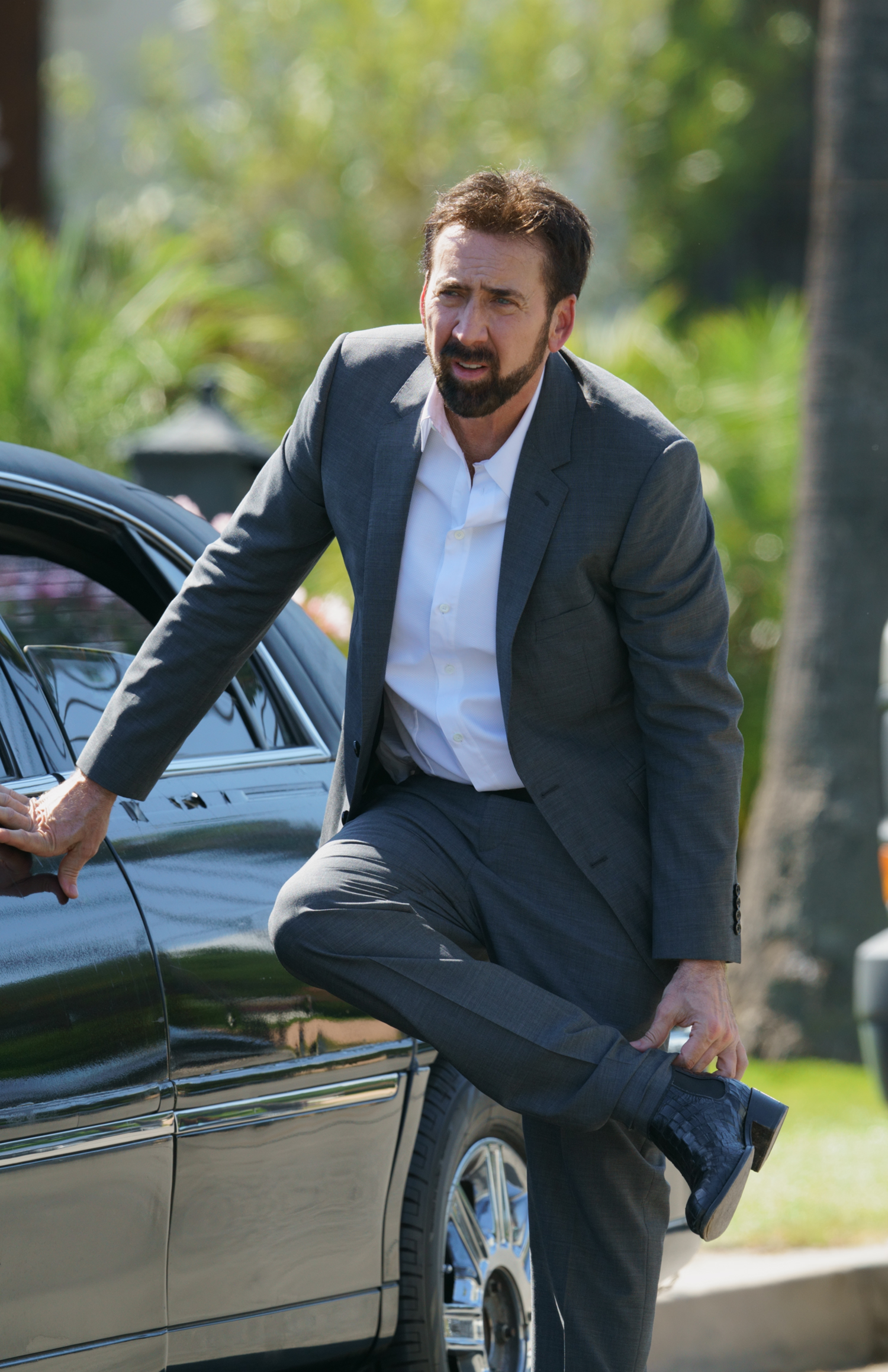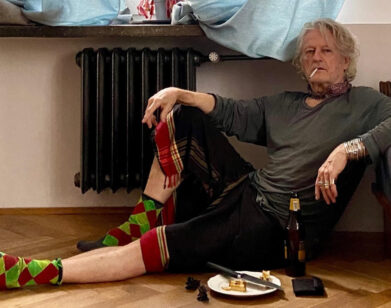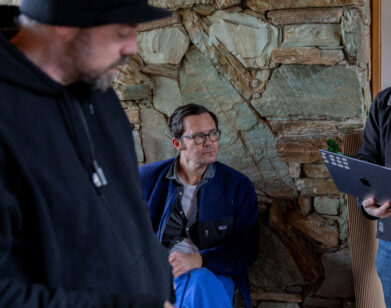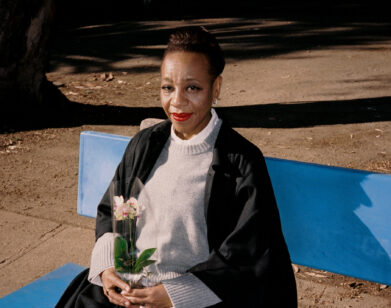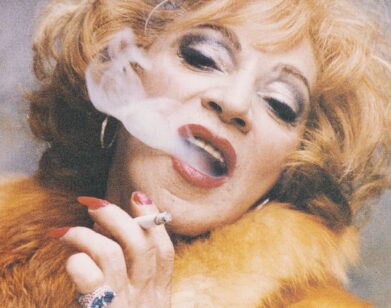fall cover story
“Cock!”: Nicolas Cage and Marilyn Manson in Conversation
Nicolas Cage needs to work, but not necessarily for the reasons you and I need to work. At 56, the owner of one of the most eclectic filmographies in Hollywood history just can’t seem to slow down. Arsenal, Vengeance: A Love Story, Inconceivable, Mom and Dad, The Humanity Bureau, Dark, Mandy, Looking Glass, 211, Between Worlds, A Score to Settle, Color Out of Space, Running with the Devil, Kill Chain, Primal, Grand Isle. All released within the last three years, all featuring Cage in try-anything mode. Whether he’s teetering on the verge of mania or whipping himself into a campy frenzy, Cage is acting with the abandon of someone who has nothing left to prove. With good reason.
A descendant of cinema royalty (his uncle is the filmmaker Francis Ford Coppola), Cage forged a path in the mold of the larger-than-life movie stars he grew up watching. But where they may have zigged, Cage zagged: first as a chiseled teen heartthrob in ’80s fare including Valley Girl, Rumble Fish, and Peggy Sue Got Married; then as the wickedly charming lead in auteurist oddities such as the Coen brothers’ Raising Arizona and David Lynch’s Wild at Heart; then as an Oscar winner for his role as an emotionally vacant alcoholic in Leaving Las Vegas; then as an action star in blow- ’em-ups such as Con Air, The Rock, Face/Off, Gone in 60 Seconds, and National Treasure. And now, against the backdrop of his B-movie bonanza, he enters, well, his Nick Cage metaphase: as Joe Exotic, otherwise known as the Tiger King, in a new miniseries based on the incarcerated, heavy-drug-using, polyamorous big-cat owner made famous by Netflix, and as a cash-strapped version of himself in next year’s The Unbearable Weight of Massive Talent. His days at the top of the box office largely behind him—he was once one of Hollywood’s highest-paid actors, earning $40 million in 2009— speculation about his career choices persist: Is he paying off debts? Is he supporting his taste for rare artifacts? Is he just bored? As he tells his friend, the musician Marilyn Manson, the answer is as complicated as it is simple.
———
NICOLAS CAGE: I’m very excited that you’re interviewing me, especially since we’ve known each other for so many years.
MARILYN MANSON: The first time we met was nebulous, because we had several encounters. One of the most memorable encounters was when you bought my first painting at my first art show. You are a collector of many different things, art being one of them. We’ve talked about the living and dead creatures you’ve accumulated throughout your fascination with the unknown and things that are of unexplainable origin. Do you collect things as trophies, or is it something you connect with your childhood?
CAGE: Certainly not as trophies. It’s a way to get things to crack, to open my imagination. It’s been like that for a very long time. It happened just by watching episodes of Rod Serling’s [horror anthology series] Night Gallery. I think those were the beginnings of me trying to understand larger-than-life performance, because many of the actors in those shows were acting in a way that was not necessarily natural, but terrifying. Sometimes, if I don’t know how to play apart, I can refer to a Francis Bacon image, or I can read a bit of poetry, and it triggers something in my mind that creates a feeling, so that I don’t have to act. I think that’s what art, for me, is really about. Animals, too. That’s why I like to surround myself with reptiles and fish and cats. I just bought a crow. His name is Huginn, after one of [the Norse god] Odin’s two ravens, Huginn and Muninn, and he’s amazing.
MANSON: Is he a raven?
CAGE: No, he’s an African pied crow. He says “hi” when I walk into the room and “bye” when I leave. The other morning he started laughing and called me an asshole.
MANSON: You think he’s genuinely speaking to you?
CAGE: I think he is.
MANSON: I believe that about my animals, too, but more importantly, why did he call you an asshole?
CAGE: I’m trying to figure that one out. He likes to eat cat food, which makes it easy, because I give my cats Sheba Perfect Portions, and Huginn enjoys it as well. I think he has a sense of humor, so maybe that’s why he called me an asshole.
MANSON: [Laughs] It was a pleasant “asshole,” like we would say to each other as friends.
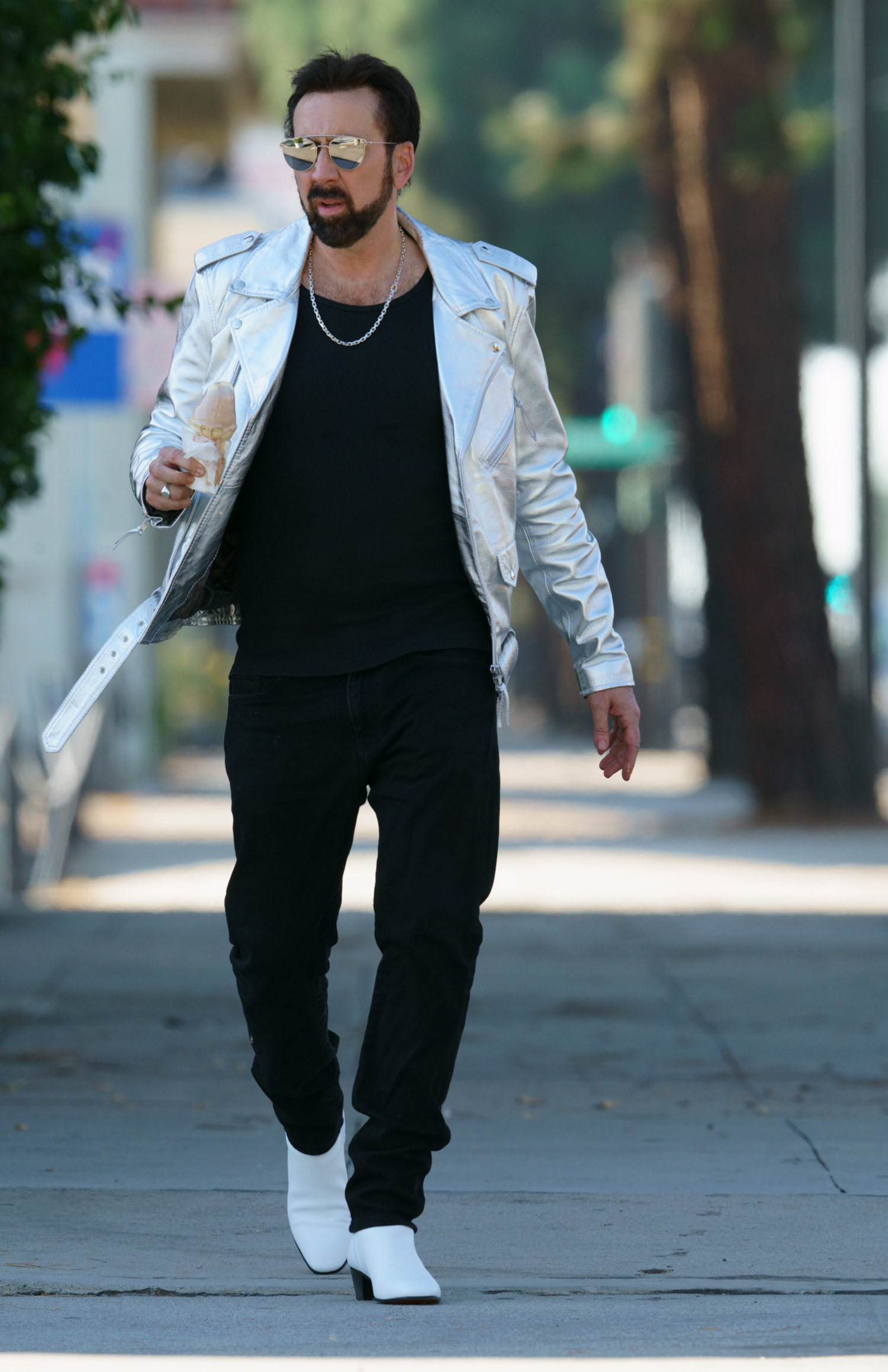
Jacket and Jeans Nicolas’s Own. Vintage Tank Top from Palace Costume. Sunglasses by Dior Men. Necklace by Tiffany 1837. Ring by Tiffany & Co.
CAGE: What do you think I should teach him to say?
MANSON: I think you should teach him how to speak different languages.
CAGE: You don’t think I should teach him to say “cock”?
MANSON: [Laughs] I wasn’t going to bring that up, but people should know the context. I awoke to a series of performances you had recorded, a multi-universe of several different characters screaming “cock” in such a loud and dissonant way. I was literally just watching Mom and Dad, which, if people missed it, is a fantastic performance by you. It reminded me of your performances that you sent me where you yell “cock.” Is there anything that draws you to certain roles?
CAGE: It has to do with life experience. Do I have the emotional record or memories to inform the performance in a way that feels authentic? Mom and Dad was the blackest of comedies, and I relished the opportunity to recall my frustration with the damned “Hokey Pokey” song in the scene when I’m smashing the pool table with a sledgehammer while singing it. That was the song in kindergarten where the teachers would figure out who was coordinated and who wasn’t. I found that very insulting, so I put it into the movie. I went all the way back to kindergarten to find that anger.
MANSON: Let it be known that my favorite David Lynch film is Wild at Heart. Your character, Sailor Ripley, stands out to me. I would love to hear about the methodology of getting into that character, because it had such an impact on me. Tell me about that role, particularly the snakeskin jacket.
CAGE: I’m a Lynch enthusiast. I used to go to the Nuart Theatre with Crispin Glover and watch Eraserhead ad infinitum. When Wild at Heart came along, we started working together on it, and I was grabbing inspiration from all kinds of different places. I was walking down Melrose Avenue and I went into a secondhand clothing store called Aaardvark’s Odd Ark, and bought this snakeskin jacket, because I wanted to be like Marlon Brando in Sidney Lumet’s The Fugitive Kind. Then, in rehearsals, I had this epiphany. I was thinking about Andy Warhol, because I believe that what you can do in one art form, you can do in another. He took icons like Mick Jagger and Elvis Presley, and made collages out of them. I thought, “Why can’t you do that with a film performance?” And then I read the book An Actor Prepares by [Constantin] Stanislavski, and he said that the worst thing an actor can do is copy another actor. I thought it was a rule that should be broken in the spirit of creating a Warhol-like experience. I feel very lucky because David let me do it. And then I said, “I’m going to talk like Elvis Presley. I think Sailor has some sort of a connection with Elvis, and that may be the source power that moves him.” And then he said, “Okay, but you’re going to have to sing a couple of Elvis songs.” I’m not a singer, but I said I’d do it. It was my way of giving him Cage, Warhol, Presley, and Brando in one performance.
MANSON: The jacket becomes sort of a talisman for the character.
CAGE: Yeah. I gave it to Laura Dern at the end of the shoot. She has it somewhere in her closet.
MANSON: It seems to me that you will be remembered for your acting more than anything that’s tabloid-related, but let it be known that my first job was as a journalist. I was actually the first person to interview myself, and that’s partially why I had a pseudonym before I had a band. I had the name for a band, and then had to write music after people thought that I was something interesting, because I created a mythology and mystique around myself. I know that you believe strongly in mythology and keeping your private life separate from your acting, and you’ve done that very successfully. This leads me to a weirder question: How do you think social media affects art and artists?
CAGE: I’ve tried to stay away from it because I’m still a big believer in the mystique and the glamour of the Golden Age film stars. I think a mystique is still achievable, but I’m still forming my thoughts about it because I don’t really know how to answer it at the moment, except that I’m afraid of it and I don’t want any part of it. I do think at some point it’s going to have to be injected into film, because it’s such a massive part of society. It’s interesting you mentioned that your first job was as a journalist because I’ve always wanted to be a journalist. I was on the high school newspaper, and I enjoyed that. I liked being a newspaperman. I’m very taken by the power of journalism and the power of conversation. What we’re doing now is exciting.

Jacket and Jeans Nicolas’s Own. Vintage Tank Top from Palace Costume. Sunglasses by Dior Men. Necklace by Tiffany 1837.
MANSON: I really believe in your concept of mystique. Despite being on social media, I’ve always been a true believer of never emptying the bucket of mystery to the world, because it’s not that we’re meant to be gods or something, but we are artists. In a world with social media, when anyone can say or create anything that goes viral, it doesn’t have the same staying power as the work that you’ve committed to celluloid. Your creativity remains in a way that will never be overtaken by social media. If it is, I’ll probably shoot myself. Not fatally, but maybe in the foot.
CAGE: I think journalism would be a great thing for me to get into between acting jobs, because the idea of contact and communication with people helps stimulate the instrument. It keeps it in tune.
MANSON: The interview is a very sensitive zone. You never know how things are going to go. For me, it makes being interviewed very easy. I already know what questions are going to be asked. Half the time, someone might just ask one question and I’ll talk for half an hour until we’re done, as you know, because you’ve often told me, “Can I get a sentence in?” This is your opportunity to get as many sentences in as possible.
CAGE: I said to you earlier, “If we do this interview and I only get one sentence in, that’s kind of funny.”
MANSON: If the only sentence you had in was, “Cock,” that’s a real interview.
CAGE: Should we clarify more where this came from?
MANSON: You explain it.
CAGE: I’ve been in lockdown for five months, trying to do the right thing, and it gets a little frustrating. So I came up with this concept of a family: Beth, David, and Kyle. David is a 13-year-old kid who can’t stop saying that word, and he likes to blurt it out in ways that create public disruption and family disharmony. The father, Kyle, is trying to be very patient, but of course David is throwing a fanny pack at him. And Kyle says, “You hit me in the head with a fanny pack? I fail to see the humor in that.” And then David shouts, “Cock!” Then finally, he begins to calm down because David has worked hard on controlling his behavior and he’s doing well in school. He wrote a great report about Leonardo da Vinci and got an A+++ for the essay. So Kyle says, “Okay, you’ve been wanting to go to Milan, so let’s go.” When they’re there, Kyle is very excited to take his son to see da Vinci’s magnum opus, “The Last Supper.” And when he reveals it to David, David of course screams, “COOOOOOCK!”
MANSON: You could not contain yourself from laughing through the whole end of it.
CAGE: That’s what I’m doing to keep myself amused. By the way, is it okay to talk about your wedding? I thought your wedding was beautiful because that’s what you were doing while you were in lockdown. I got to see a little of it on FaceTime, and I thought it was very beautiful, the way you sang “Love Me Tender.”
MANSON: You were the only guest at the wedding on FaceTime. And you definitely cock blocked me on singing “Love Me Tender,” because you mentioned you were going to sing it to us, but I had set up a karaoke machine to do it myself. We both sang it in the end, and your version was even more beautiful.
CAGE: I didn’t know you were going to do it. There was no “Coooooock” block! But let me say one thing: You are blessed. Since this whole thing happened to us—and of course I feel terrible for everyone who has succumbed to this horrifying virus— I have not seen Riko [Shibata, Cage’s girlfriend] for six months. As soon as we got back from New York, she had to go to Japan, and now all Americans are banned indefinitely from flying to Japan. She can’t come here because then she can’t go back to Japan without being put in a government facility for weeks on end. So you’re blessed. I’m here with my cats and my crow and my occasional improvisational situation comedies that I do on voicemail, but that’s about it.
MANSON: Would you like me to travel to Las Vegas so that we can spoon together?
CAGE: [Laughs] I don’t know if I’m ready for that one.
MANSON: It doesn’t have to be anything sexual. If you need someone to hold you that looks like your little brother, I can do it.
CAGE: I appreciate the offer, but I’m actually great with my cats. I don’t mind watching a movie with you, though. We were good buddies with Johnny Ramone, and we would all hang out at his house. Do you remember that time I had that mummy’s hand with tattoos on it?
MANSON: I can’t remember if it was a monkey’s paw or a mummy’s hand.
CAGE: It was an actual hand.
MANSON: I remember there was a big debate about shrunken heads, but continue.
CAGE: Well, there were shrunken heads, but there was also a mummified hand, and you were very interested in seeing it, but you wouldn’t pick it up unless you had a tissue. Do you remember that?
MANSON: I don’t remember that. I’ve touched far worse things, maybe on a daily basis when I use the bathroom. I know that you’re very well-read and very enthusiastic about alchemy and the origins of everything that exists in the world. Is numerology something that you think about, and do you have a magic number? Mine’s 15.
CAGE: Seven. It’s kind of cliché, but the number has had power for me. If you want to walk down the road of the esoteric, what’s always been most powerful to me is something as simple as blowing out candles on a birthday cake. I really take those wishes seriously. It’s almost like a meditation. And more often than not, those wishes have come true.
MANSON: I do believe in the power of belief. If you have something that you desire, I think as much power that you put into it is probably what you can get back from it.
CAGE: I totally agree with that.
MANSON: I was asking you about magic numbers, which does tie into the fact that you live in Vegas. Do you gamble?
CAGE: The last time I gambled was about 30 years ago. I was in the Bahamas, and I walked into a casino and felt like I had my mojo with me, like nothing could go wrong. My game was roulette. I went in with $200, and I didn’t miss a number, so much so that even the lady spinning the wheel said, “Nothing sweeter than a repeater.” In 20 minutes I turned $200 into $20,000, so I went and found an orphanage in the Bahamas, met all the kids and the headmistress, and said, “This is for you.” I put the 20 grand in her hand, walked away, and never gambled again, because if I did, it would ruin the power of that moment.
MANSON: I’ve never heard that story.
CAGE: It’s true. And you can’t live in Vegas if you’re a gambler. I’ve seen it destroy people. Of all the addictions, I think it might be the worst.
MANSON: I find it hard to define addiction or obsession, or something that consumes you like a ghost. You’ve talked a lot about magic and numbers and fate and coincidence and different elements of the esoteric or occult or whatever word people want to use to identify something that’s unidentifiable. You’ve mentioned a shamanic element to approaching acting.
CAGE: What is magic but imagination combined with will to create effects in the natural world? Anything can be a work of magic. A great speech can be a work of magic. A scientific discovery can be a work of magic, because it takes imagination to come up with the solution.
MANSON: We live in a world where artists don’t lead the way in the traditional Greek sense, when artists dictated the way things go. Religion and politics have taken over, and that drives me. Does it drive you to keep doing what you’re doing out of frustration for the stupidity in the world?
CAGE: I don’t have a mission or an altruistic need to help or guide or create chaos. It’s more a mechanism within me that has to express something, because if I don’t, I can become very self-destructive. I have to get it out in a productive, creative way, and that’s where creating characters and expressing whatever’s happening in my psyche has been enormously therapeutic.
MANSON: That’s the mission I meant.
CAGE: But Manson, having said that, I do think that art can be like medicine. It gives people joy and nightmares, breaks up the monotony, even helps us get out of our own selves and take a break from whatever crap is going on. It goes both ways.
MANSON: But, more importantly, it’s good for your mental well-being.
CAGE: Exactly, which is why this period of time when so many of us can’t work—it’s been new.
MANSON: I’ve never taken a vacation. Have you?
CAGE: No, I haven’t. What I love about you is that you have so many talents. Your paintings are magnificent. I love the one you did of me, and I loved what your ingredients were, that you used tattoo ink and an Alice in Wonderland paint set. Who does that? That’s inspiring.
MANSON: We have the ability to step outside of ourselves and talk to each other as regular human beings, despite the fact that I adored everything you’d done before I met you. It’s a very difficult relationship to find in Hollywood. Do you find it difficult to get along with other people? You put your heart and soul into what you’re doing. Do you bring it home with you?
CAGE: My character in Color Out of Space was oscillating all over the place in terms of his emotions. He went from being a kind and gentle father to an abusive and terrifying father within a matter of seconds. That kind of a character, if you’re really trying to tap into the psyche of it so that you’re not faking it, can start to take over. I was not in the best mood when I was making that movie, so I would just go to my room and try to stay away from people. Red wine has been helpful in that when I finish a movie and need a weekend to take the character out of me, it helps blur the line so that I can start to forget about it. But you have to be careful, because that’s a slippery slope.
MANSON: Do you only drink Coppola wine?
CAGE: I like his wine. He has a beautiful wine called Inglenook. It’s very buttery and I like that. The other one I like is Rubicon. But I’m primarily interested in Italian wines. There was a time when I was collecting French, Californian, and Italian. Now, if I’m going to have red wine, I’ll drink an Italian, some great Barolos, some great Super Tuscans, some Sassicaia, Masseto, and Solaia.
MANSON: I’m going to try to tie together wine and romance. When you’re playing a romantic role, is it difficult to not actually fall in love with someone who you’re supposed to be in love with in a movie?
CAGE: It was when I was younger. I had a very powerful crush on Deborah Foreman when we were do- ing Valley Girl. I felt a lot for Bridget Fonda when we were doing It Could Happen to You, and for Penélope [Cruz] when we were doing Captain Corelli’s Mandolin. But as I got older, I no longer was interested in that. I was all about the work.
MANSON: Is it difficult to be romantic without having romantic feelings? That’s a tough emotion to fake.
CAGE: Well, you feel it, and that’s the weird thing about filmmaking. Everybody is so close. There’s a bubble over the whole set. And then, as soon as the movie is wrapped, no one talks to anybody anymore. It’s almost like we’re embarrassed that we were ever that close, like there was something artificial about it and now we don’t know what to do with our feelings. But I’ve remained friendly with most of my costars, and sure, you get feelings and use those feelings in the work, but you know that those feelings will be poison if you bring them home to your wife.
MANSON: Does that scramble up your reality?
CAGE: My reality with women has been mystifying ever since I was born. I didn’t have any sisters, and my mother did the best she could, but she wasn’t really in a state of well-being where she could be there for me, so I never really had female energy growing up. I had two older brothers, and my father was the caretaker, so I had a lot of masculine energy around me. Women have always been the most beautiful and the most amazing and the most mystifying and the most compelling of creations, so I tend to have a vulnerability toward them.
MANSON: What was it like working with Werner Herzog on Bad Lieutenant: Port of Call New Orleans?
CAGE: I’m not going to put anything on record in terms of what I did or didn’t experience, but I did buy the most haunted mansion in New Orleans, which is known as the LaLaurie Mansion. We had a big party, Werner came over, and, at the time, I owned a two-headed snake, which I had spent a lot of money on and subsequently donated to the Audubon Zoo. But I brought it out, and everybody was freaked out by it. Werner said, “Now, Nicolas, we have to put that into the movie.” I said, “No, I’m not putting it into the movie because this is personal.”So he filled the movie with snakes, iguanas, and alligators, but he never got the two-headed snake. But anyway, I was completely dry back then. I hadn’t been drinking for, like, four years, so I call that my impressionistic film performance, because I had to recall from deep in the recesses of my memory those decadent days I may have had years ago, when I was 26, to find that feeling of what it was like to be on all those stimulants.
MANSON: It’s so convincing, but it doesn’t come across when you watch the film that you’re watching Nicolas Cage. That goes for pretty much every role I’ve ever seen you in. You are never the same character.
CAGE: Thank you. I would like to be known that I thought your version of “The End” by the Doors is probably the most powerful thing I’ve heard in the last ten years, so thank you for that.
MANSON: It was great letting you get a sentence in, Nick.
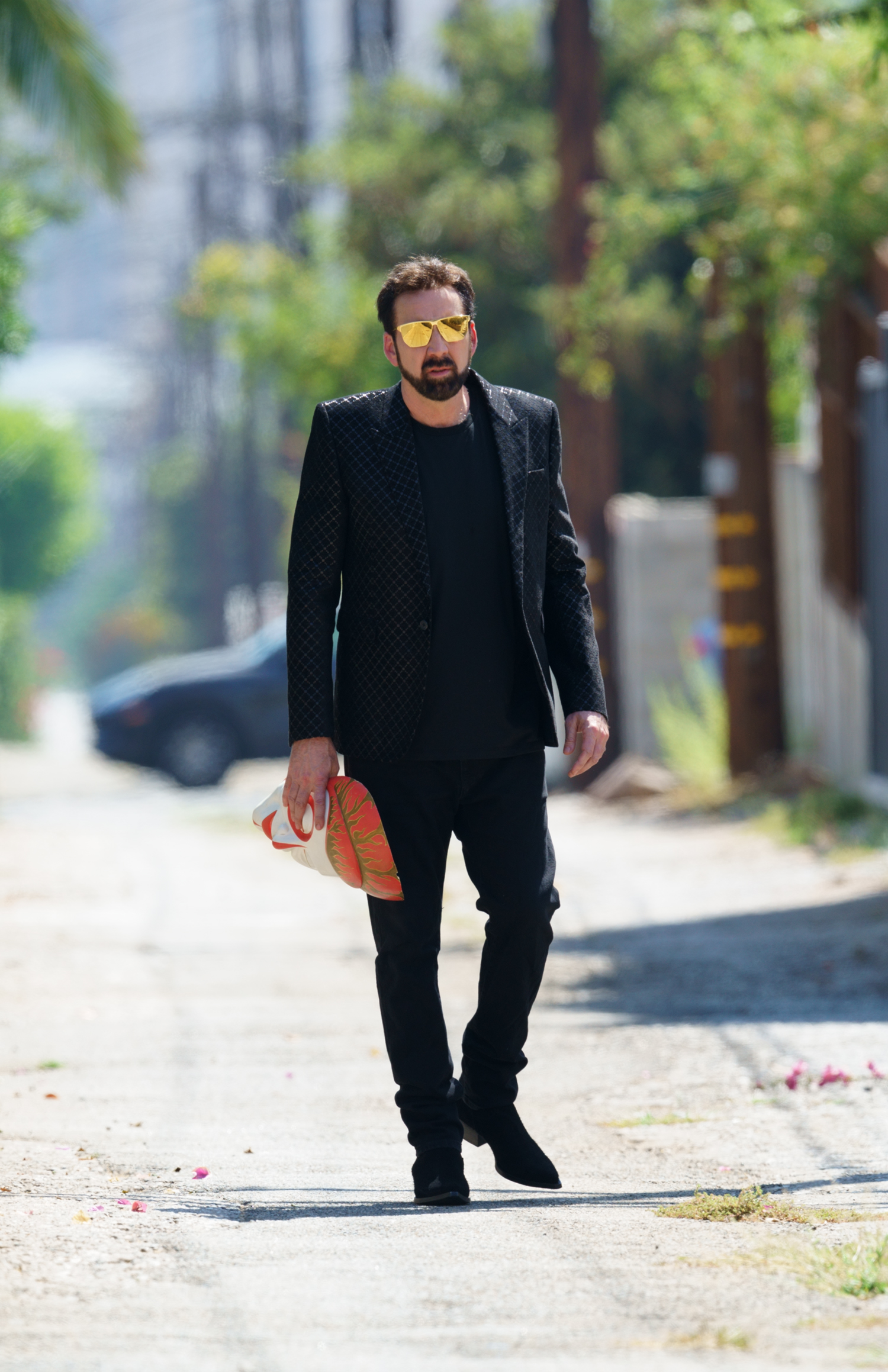
Blazer, Top, and Shoes by Saint Laurent by Anthony Vaccarello. Jeans Nicolas’s Own. Sunglasses by Bottega Veneta.
———
Grooming:Pamela Warden
Fashion Assistants: Abi Arcinas and Bin X. Nguyen

